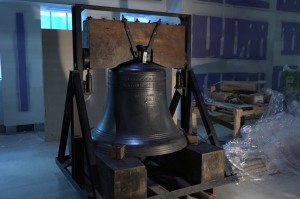Revelation 3: The church that was frail, but was fabulous

One of the finest speeches ever delivered by an American President was given on June 26, 1963, in West Berlin.
Less than two years earlier, East Germany had erected the infamous Berlin Wall, which had become a profound international symbol of the great divide between those who were free and those who were under the heel of communism.
Standing on the steps of the Rathaus Schoenberg before an audience of 450,000 Berliners, President John F. Kennedy said:
“Two thousand years ago, the proudest boast was civis romanus sum [I am a Roman citizen]. Today, in the world of freedom, the proudest boast is Ich bin ein Berliner!… All free men, wherever they may live, are citizens of Berlin, and therefore, as a free man, I take pride in the words, ‘Ich bin ein Berliner!'”
Jesus’ sixth letter to the churches in the book of Revelation is to the Church of Philadelphia – Philadelphia, meaning “Brotherly Love.” (Revelation 3: 7-13).
Our Lord doesn’t offer even a hint of rebuke to this church. He has nothing but praise for them. Therefore, Christians everywhere committed to being Christ’s body worldwide might take pleasure in saying, “I want to be a Philadelphian churchman.”
Every church should be like the Church in Philadelphia because it was a very loving church. It was firmly committed to doctrinal purity and godly living, but unlike the Church in Ephesus, it wasn’t cold, legalistic, or insufficiently caring. It struck that essential balance between holding fast to biblical truth and acting from a charitable disposition.
American minister and writer Sherwood Eliot Wirt once said: “I have learned there is no point in talking about strong and weak churches, big and little churches. Such categories are unrealistic and beside the point. There is only a loving church or an unloving church.”
The apostle Paul said he could give all that he had to the poor and could offer his own body for burning at the stake, but if there were no love in his heart, he would still not be a real Christian – everything he did in Christ’s name would be no more than “a noisy gong or a clanging cymbal” (I Corinthians 13:1-3).
Many years ago, after arriving home from a long trip, my parents told me about a remarkable experience. They said that at one point in their travels, they became hungry and decided to stop at a restaurant which turned out to be very crowded. All the tables were full, and there was nowhere to sit down. Seeing their predicament, a deputy sheriff sitting at a table alone invited them to join him at his table.
Somehow, my parents said, the conversation turned to matters of faith, and the deputy began to share a fantastic story. He expressed that many of his family members, devout Christians, repeatedly asked him to go to church with them. He always hedged his way out of it and sometimes just boldly refused. Over time, he started to resent them for asking.
Nevertheless, they asked him again when revival services were being held in the Fall of the year. This time he said that he accepted their invitation, but with a plan to stop them from ever asking him to church again.
Before leaving for the services, he drank some whiskey so the smell of alcohol would be heavy on his breath. Then he splashed some of it on himself like he would cologne. No doubt, he thought, reeking of liquor and perceived intoxicated, he would embarrass his family before the entire church and never be invited again.
Much to his surprise, however, he received just the opposite response from everyone. His family was delighted to have him with them, and the church overwhelmed him with grace and love. So moved by their genuine affections, he said he could not resist giving his life to Christ.
Jesus said the Church in Philadelphia had a “little strength” (v. 8). In other words, they were frail, but they were fabulous. They weren’t a prominent congregation and probably didn’t have many members. They weren’t stylish. Yet, Jesus said that he found them faithful.
Do you know how Christ defines a successful church? Success is not determined in terms of offerings, the size of its membership rolls, community status, or how erudite the parson. Indeed, this is the way many define an exceptional church. But true success is determined primarily by one standard — faithfulness. The Scripture says, “Now it is required that those who have been given a trust must prove faithful” (I Corinthians 4:2). No institution in the whole world has been given a greater trust than Christ’s Church — that trust is to keep his Word and to proclaim his name (v. 8).
My wife and I were married in a church with a sign at the front of the sanctuary that read: “To Know Him and to Make Him Known.” That’s a good description of the church’s mission. Drawing from the Church in Philadelphia, a similar sign might read: “To Keep His Word and To Proclaim His Name.” This is what Philadelphia was wholly committed to doing.
Jesus also said he had set an “open door” before this church that “no man could shut.” When God’s people are faithful, revival breaks out with new opportunities for evangelistic and other mission endeavors that advance God’s kingdom. If Christian love is coupled with hearts contrite over sin, a fresh wind from God rushes through his house, clearing out Sardis’s decomposing smells and supplanting it with the sweet savors of Philadelphia revival.
I recently learned about a guest minister who said he preached with extraordinary energy in a revival meeting. Still, at the end of more than several days of meetings, he said it seemed to have little effect on the church or the community.
“I learned the cause for the failure from the frustrated pastor who told me of a split between two prominent families of the church which he was unable to heal,” said the guest preacher. “Both families attended church for years but refused to speak to each other.”
Churches today hardly know anything of a genuine revival experience. But if an appreciable number of God’s children would penitently plead: “Create in me a clean heart, O God; and renew a right spirit within me” (Psalm 51:10), they would see such a movement of God in their midst it would likely produce goose-bumps on the pews.
Revivals were characteristic of what is called the Philadelphia Period in church history (1700-1900). This period was the greatest missionary age since the Church of Ephesus or the Apostolic period. These tremendous movements of God — the Great Awakening — revivals — the era of Wesley, Whitfield, Edwards, Finney, and Moody resulted in the salvation of untold thousands upon thousands and even profoundly impacted the American colonies in the 1730s and 40s. These awakenings came at a time when secular rationalism was emphasized, and an appetite for the things of God was sorely suppressed.
Finally, the Lord promises in his sixth letter to the Church in Philadelphia that he would return swiftly and keep them from the great Tribulation that would come upon the whole world and try those who belong to it (v. 10).
Some believe this text has an immediate application and probably refers to an empire world crisis, specifically the Roman Empire at that time, which affected both believers and unbelievers. But Christ promises to keep his faithful safe.
Others, however, such as Clarence Larkin in his book, The Book of Revelation, argue:
“[T]his ‘Hour of Tribulation’ must still be future and refers doubtless to the ‘Great Tribulation’ that is to come upon the ‘whole world’ just before the return of the Lord to set up his Millennial Kingdom, and as the promise is that the ‘Philadelphia Church’ shall not pass through the Tribulation, is not this additional proof that the Church shall be ‘caught out’ [in the Rapture] before the Tribulation?”
Whichever interpretation is correct, the message is clear — no matter how great the trials that beset believers, those who stay faithful to the Lord may always be assured they are secure in Christ’s care.
What is more, faithful followers of Christ are promised to be made pillars in God’s temple, possessing esteemed positions of stability and support. God will write His name upon them so that they bear the brand of their benevolent master. Thus, allowing them access to the City of God, New Jerusalem, where they will also be given a new name that entitles them to see his face and serve him joyously forever (v. 12).
The apostle Paul wrote, “No eye has seen, no ear has heard, and no mind has imagined what God has prepared for those who love him” (I Corinthians 2:9).
“He that has an ear let him hear what the Spirit says to the churches” (v. 13).
Rev. Mark H. Creech is Executive Director of the Christian Action League of North Carolina, Inc. He was a pastor for twenty years before taking this position, having served five different Southern Baptist churches in North Carolina and one Independent Baptist in upstate New York.




























